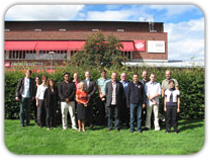
The FLAVIOLA Consortium
The FLAVIOLA Vision
FLAVIOLA’s vision was that through collaborative research into the function and delivery of flavanols, we provided the foundations for the development of innovative and natural food products that have a far-reaching impact on European public health and well being.“FLAVIOLA was a unique research project. We
aimed to develop an optimised flavanol-rich diet without altering
the natural flavanol source or enriching dietary flavanol
content,” commented Prof. Kelm, Professor of Medicine and
Cardiology, Heinrich Heine University, Düsseldorf and FLAVIOLA
Scientific Director.
Prof. Kelm, FLAVIOLA Scientific Director

Cutting-edge Research
The role of cocoa flavanols in health has been investigated for over 20-years, so what makes FLAVIOLA novel?
The FLAVIOLA project employed a multidisciplinary, translational research approach to address the gaps and challenges that exist in the field of flavanol research as it relates to cardiovascular health and aging. To achieve the project goals outlined below, FLAVIOLA utilized state-of-the-art analytical techniques, rigorous and well-designed clinical studies, and the knowledge and experience of experts from academic, government, and industry partners.
Our Objectives
In order to gain a comprehensive and in-depth understanding of the function and delivery of flavanols, FLAVIOLA focused on a broad range of complementary aspects.
Research aims of the FLAVIOLA project were to:
- Investigate the absorption and metabolism of flavanols in humans, including inter- and intra-individual variation
- Establish the levels of habitual flavanol intake in the EU
- Assessing the impact of the dietary intake of flavanols on cardiovascular function in healthy adults
- Develop a cocoa food product prototype containing flavanol for use in the context of cardiovascular health
Expected Impact
In order to gain a comprehensive and in-depth understanding of the function and delivery of flavanols, FLAVIOLA focused on a broad range of complementary aspects.
Research aims of the FLAVIOLA project were to:
- Investigate the absorption and metabolism of flavanols in humans, including inter- and intra-individual variation
- Establish the levels of habitual flavanol intake in the EU
- Assessing the impact of the dietary intake of flavanols on cardiovascular function in healthy adults
- Develop a cocoa food product prototype containing flavanol for use in the context of cardiovascular health
